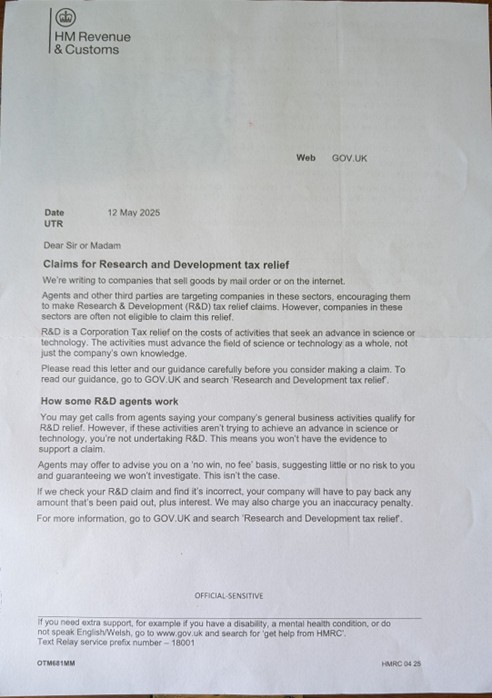David Brackin is a contributing editor to ChannelX and founder of StuffUSell. Today he looks at R&D Tax Relief and the unintentional pitfalls the scheme has created as ecommerce businesses grapple with the paperwork and how some agents are too eager to massage applications that could later backfire.
Missing a deadline usually costs you – but sometimes it saves your bacon. That was my reaction when this HMRC letter about Research & Development (R&D) tax relief landed in my post last month.

The timing couldn’t have been sharper. HMRC’s latest annual report reminded everyone that £1.13 billion – 16.7% of all SME R&D claims in 2020-21 – were flagged as containing errors or potential fraud. It’s a big number. And it sheds light on why sellers, particularly those in ecommerce and platform development, are suddenly under scrutiny.
Like many e-commerce businesses, we’d looked at claiming R&D relief for our platform development work. In our case, the activities genuinely qualify: we were building novel systems, not just configuring off-the-shelf solutions. But the rules felt so byzantine that we kept postponing the application. In hindsight, I’m now somewhat relieved we never reachout out for help from one of the agencies HMRC references.
HMRC’s letter explicitly warns against the activities of some agents. Many operate on a “no win, no fee” basis, making it sound risk-free. But it isn’t: if your claim is later judged incorrect, you’re on the hook to repay the relief – with interest and possible penalties. The clampdown is real. Even reputable advisers now find themselves operating in a landscape of retrospective scrutiny and shifting compliance expectations.
Goodhart’s Law (when a measure becomes a target it becomes a bad measure) is alive and kicking us all here: turn an incentive into a target and optimisation quickly outruns genuine innovation. You might argue that a scheme designed to fuel breakthroughs has morphed into a paperwork arms race. The collateral damage? It lands on founders who already have limited bandwidth and cannot afford to risk an investigation at a compliance cliff-edge.
For marketplace sellers and ecommerce operators, the lesson is clear. If you’re considering an R&D claim:
- Read the actual HMRC guidance (https://www.gov.uk/guidance/corporation-tax-research-and-development-rd-relief) first.
- Be very clear whether your activity genuinely advances science or technology – not just improves your business.
- Be wary of third-party agents making it sound like a guaranteed win.
R&D drives productivity growth. It is an engine for the economy. The broader question is whether this scheme, like so many others, has become too complex for the businesses it aims to help. If you need paid translators to access a relief, is the problem with businesses, advisers – or the policy itself?
That’s one for policymakers to chew over. For now, caution and clarity should be the watchwords for ecommerce firms navigating the R&D maze.
